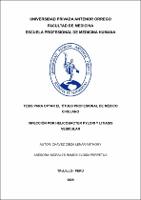Mostrar el registro sencillo del ítem
Infección por helicobacter pylori y litiasis vesicular
| dc.contributor.advisor | Morales Ramos, Eloisa Perpetua | |
| dc.contributor.author | Chávez Cieza, Lenar Anthony | |
| dc.creator | Chávez Cieza, Lenar Anthony | |
| dc.date.accessioned | 2020-09-11T21:29:52Z | |
| dc.date.available | 2020-09-11T21:29:52Z | |
| dc.date.issued | 2020 | |
| dc.identifier.uri | https://hdl.handle.net/20.500.12759/6532 | |
| dc.description.abstract | Dentro de las patologías extradigestivas que actualmente generan incertidumbre y elevado interés en la comunidad científica tenemos a la litiasis vesicular que, de acuerdo a las revisiones y estudios prospectivos realizados hasta la actualidad, se ha observado una asociación controversial con la infección por Helicobacter pylori que ha conllevado nuevos planteamientos que expliquen su relación e identifique factores de riesgo modificables para prevenir una infección por éste patógeno. Así mismo, en el desarrollo de la revisión se pudo evidenciar que de acuerdo a los lineamientos de OXFORD 2009 sobre medicina basada en evidencia, se encontró que la bibliografía era mayormente 3a o 3b con respecto a la infección por H. pylori en relación al riesgo de desarrollar litiasis vesicular, que si bien, hay evidencia que demuestran la presencia de Helicobacter pylori en la vesícula o vías biliares de pacientes con colelitiasis, muchas otras investigaciones no han encontrado alguna asociación significativa entre esta bacteria y su contribución en la formación de cálculos biliares. Por lo que se requiere de investigaciones con estándares científicos mas altos que ayuden a dilucidar esta asociación. | es_PE |
| dc.description.abstract | Among the extradigestive pathologies that currently generate uncertainty and high interest in the scientific community, we have gallstones that, according to reviews and prospective studies carried out to date, a controversial association with Helicobacter pylori infection has been observed. led to new approaches that explain their relationship and identify modifiable risk factors to prevent infection by this pathogen. Likewise, in the development of the review it was possible to show that according to the OXFORD 2009 guidelines on evidence-based medicine, it was found that the bibliography was mostly 3a or 3b with respect to H. pylori infection in relation to risk of developing gallstones, that although there is evidence to demonstrate the presence of Helicobacter pylori in the gallbladder or bile ducts of patients with cholelithiasis, many other investigations have not found any significant association between this bacterium and its contribution to the formation of gallstones . Therefore, research with higher scientific standards is required to help elucidate this association. | en_US |
| dc.description.uri | Tesis | es_PE |
| dc.format | application/pdf | es_PE |
| dc.language.iso | spa | es_PE |
| dc.publisher | Universidad Privada Antenor Orrego - UPAO | es_PE |
| dc.relation.ispartofseries | T_MED.HUMA_2825 | |
| dc.rights | info:eu-repo/semantics/openAccess | es_PE |
| dc.source | Universidad Privada Antenor Orrego | es_PE |
| dc.source | Repositorio Institucional - UPAO | es_PE |
| dc.subject | Infección por helicobacter pylori | es_PE |
| dc.subject | Litiasis vesicular | es_PE |
| dc.title | Infección por helicobacter pylori y litiasis vesicular | es_PE |
| dc.type | info:eu-repo/semantics/bachelorThesis | es_PE |
| thesis.degree.level | Título Profesional | es_PE |
| thesis.degree.grantor | Universidad Privada Antenor Orrego. Facultad de Medicina Humana | es_PE |
| thesis.degree.name | Médico Cirujano | es_PE |
| thesis.degree.discipline | Medicina Humana | es_PE |
Ficheros en el ítem
Este ítem aparece en la(s) siguiente(s) colección(es)
-
Medicina Humana [2774]

